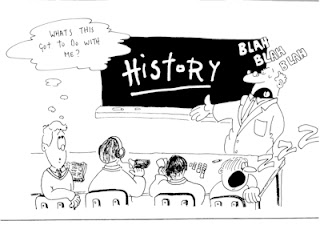In my first year of teaching I taught both English
and History. At that stage I was happy to teach both as I loved both
disciplines and had absolutely no idea of the intricacies of balancing two
subjects with two separate sets of prep and horror of all horrors, THE MARKING!
Our HOD History was a well-meaning but officious
woman who did classroom inspections to see just how well we communicated a love
for the subject to our students. That such enthusiasm was measured by how we
presented our classrooms and not by how we actually taught made me feel a
little like one of those window dressers presenting the latest goods in a
manner that would attract the most sales. My classroom was festooned with
posters, maps, charts, battle plans and anything else vaguely historical I
could find. Alas, to no avail. She walked in, pursed her lips, shook her head
sadly and declared her disappointment that I had nothing displayed on the
ceiling. It smacked of a royal command and so the next project I assigned my
grade 8s was to build model World War I aeroplanes which I then proceeded to
suspend above us, to all intents and purposes as though we were about to be
strafed with enemy gunfire. My passion for teaching History was downed as
quickly as those wood and paper constructions and I confess that it has never
resurfaced. I suspect that this is not a bad thing as I was not a very
interesting History teacher: the syllabus aside – just how do you make the
Great Trek and the Boer Wars interesting? – I nearly droned myself to sleep,
let alone my students.
My love of History remains but is now confined to
reading the latest Paul Johnson or Anthony Beevor, the latter of whom must be
considered one of the greatest historians of the modern era.
No, my true passion was the teaching of English and
so it has remained. It felt as though it was a natural extension of me and that
feeling has not diminished over time. There have been days when I have felt as
though I have somehow beaten the system: I am paid for indulging what I love
most and then am given school holidays to boot. My love for what I do is
twofold: I love teaching, and I love Literature even more. The combination of
the two is a heady experience.
But as with everything else, doing something you
love does not make it less difficult and the teaching of English is fraught
with problems – so many that to be quite honest I am not sure where to begin. First
of all is the fact that the students I teach are all English first language
speakers: when they sit at table and ask someone to pass the salt the request
is understood – in other words, if I already speak the language, why on earth
do I need to study it?
With the greater use of technology in the classroom this feeling of the pointlessness of studying English has grown
exponentially of late –
spell checks and grammar checks seem to negate the need to learn essential
language usage, in particular in its written form. After all, very few people
actually write letters and use snail mail anymore – emails are quicker and far
more convenient.
The fact that language has deteriorated seems
unimportant to most students and they are not even aware that this has happened:
television shows, online games, sms language and a diminished culture of reading
have so infiltrated modern social contexts that poor language usage is not
recognised or even seen to be problematic. I am by no means a purist and I recognise
that languages evolve and change, adapting to lifestyles and cultures, and I welcome
the flexibility regarding many of those outdated rules regarding the use of
split infinitives and beginning a sentence with a conjunction but people, there
is a limit!
Descartes wrote ‘I think therefore I am’ – and if
who I am is important to me then I believe I need the words to tell that to
others, but mainly to be able to tell that to myself.




No comments:
Post a Comment